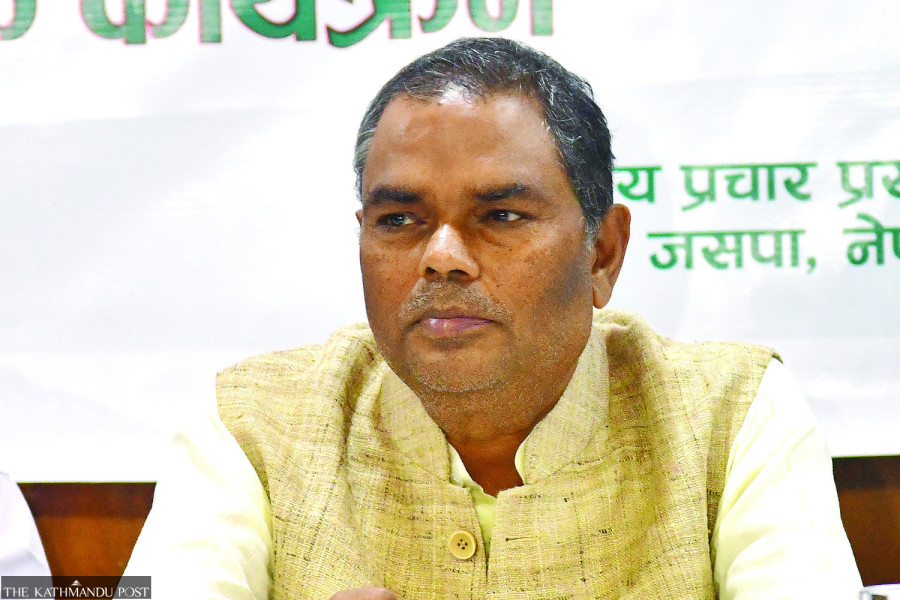Politics
Rights body recommends Yadav, others be probed for 2007 Gaur killings
As many as 27 individuals linked with the Maoists were killed and 115 others left injured.
Binod Ghimire
The National Human Rights Commission has recommended that the government probe Janata Samajbadi Party chairperson Upendra Yadav among 129 others in connection with the 2007 Gaur massacre and take action if he is found guilty.
The constitutional rights watchdog has concluded that the killings of more than two dozen people were well orchestrated and both the then Madheshi Janadhikar Forum Nepal and CPN (Maoist) were aware of possible violence.
On March 21, 2007, as many as 27 individuals associated with the Maoists were brutally killed and another 115 injured in the incident.
As neither party took an initiative to averting the violence, the commission has also decided to draw the attention of Pushpa Kamal Dahal, then Maoist chairperson, Prabhu Sah, then general secretary of the Madheshi Mukti Morcha, Bindesh Yadav Rautahat, district chief of the then ‘People’s government’, the administrative wing of the Maoist party, and Yadav, the then MJFN chairman.
“The parties concerned must stop the politicisation of the incident and support the Nepal Police and the district attorney in completing the probe,” reads the NHRC decision. “They should publicly commit not to repeating such heinous crimes in the future.”
More than 15 years after the incident, the commission on Tuesday also directed the government to take departmental actions against then Rautahat district police chief Yogeshwar Romkhami; then chief district officer Madhav Prasad Ojha; Superintendent of Police Ram Kumar Khanal; deputy superintendent of Armed Police Force Dharmananda Sapkota; and sub-inspector Kamakhya Narayan Singh. If they are not in service, don't give them an opportunity in future government service, the commission further said.
The commission has also directed the government to provide compensation of Rs300,000 to the families of each deceased and free treatment for the injured. The government has been asked to report to the commission within three months whether or not its recommendations have been implemented.
The commission had started an investigation immediately after the incident and the report was submitted on April 11, 2007. However, it took the commission another 15 years to decide on the matter.
The commission was headless when the incident happened and an investigation started. Though the earlier leadership had shown an interest in the probe, its tenure expired without taking a decision on the matter.
Surya Dhungel, a member of the commission, said clearing pending cases has been one of their priorities. “The commission had completed the investigation in 2007 itself. We took the decision after revisiting the report while also studying reports from the government’s probe panels and by different human rights organisations,” Dhungel told the Post. “The Gaur police are yet to start a probe in the matter. As a result, the perpetrators of the barbaric crime remain outside the purview of law.”
The commission said the incident happened as the Maoists insisted on holding their programme in the Rice Mill area of Gaur where the MJF-Nepal had already booked a spot as the venue for its mass meet.
Several human rights commissions came to similar conclusions. In its report in April 2007, the Human Rights Watch remarked that there was no doubt that most, if not all, of the killings could have been prevented.
“On 21 March the MPRF [Forum] leadership allowed hundreds of its supporters to file into Gaur, armed with prepared bhaatas, knowing that if used, they could be lethal. It also cannot be excluded that MJFN supporters were carrying firearms,” the report said. At the minimum, the MJF-Nepal supporters were prepared to use lethal weapons and did so, it added
The Maoists’ move of organising a rally at the same time and place as the MJF-Nepal, as it had done in other locations, was provocative, the human rights reported. “Its cadres also brought at least one weapon and at least one socket bomb to the rally. After its own stage had been attacked, the Maoists mounted a violent charge in the direction of participants of the MJFN rally and vandalised its stage,” the report added.




 8.67°C Kathmandu
8.67°C Kathmandu














